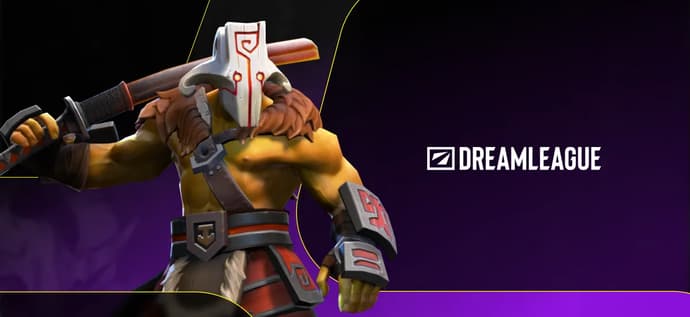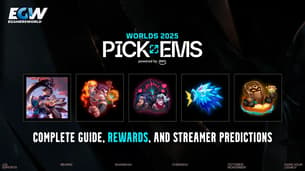
DreamLeague Season 27 Preview: Breaking Down the Favorites and Underdogs

It is once again time for the best players in the popular MOBA game, Dota 2, to come together and duke it out on one of the biggest stages. DramLeague Season 27 will be on the program soon and will look to end 2025 with a bang. From December 10 to December 21, the online event under the ESL Pro Tour (EPT) banner will have a total prize pool of $1 million USD, and plenty of club rewards and EPT points. It is more than enough for the best organizations in team based esports to compete and prove they are the best. Bragging rights always come extra with the trophy and the accolades.
The tournament will host 24 teams that compete in a Swiss system group stage. That is followed by a double elimination playoff bracket, which culminates in a best of five grand final. Other matches are going to be best of three. The event marks the first of three tournaments in the 2025/2026 EPT season to follow the refreshed format. A lot is on the line for the players, obviously, but also the fans. The Dota 2 fandom is huge, and it is only growing bigger thanks to competitive video game betting that is very popular when huge tournaments like this are on schedule. If you consider yourself a fan, read on to learn more about the event as we bring Expert DOTA 2-DreamLeague Season 27 betting tips to help you along the way.
Qualification structure and team roster
For Season 27, teams entered the event through three paths: direct invitations, regional closed qualifiers, and via the newly introduced DreamLeague Division II circuit. ESL expanded DreamLeague from 16 to 24 teams and replaced the older two phase group stage with a Swiss system to better accommodate the larger field. It is now more modern and in tune with other similar tournaments in the gaming sector.
Eleven teams have been granted direct invitations based on their stature and previous season performance. These include Team Falcons (the International 2025 champion), PARAVISION (last season’s DreamLeague champion), Team Spirit, Team Liquid, Xtreme Gaming, BetBoom Team, Tundra Esports, Nigma Galaxy, Heroic, Aurora Gaming, and Talon Esports.
Eight teams earned their slots through regional closed qualifiers held from September 24 to 26, 2025. In Western Europe, the qualifier awarded three slots, whereas in most other regions (Eastern Europe, Southeast Asia, China, North America, South America), one slot was open per region. The closed qualifier format was double elimination, and in most regions, finals were best of five (Western Europe used best of three to send through their three teams).
The eight teams that qualified via those regionals include Natus Vincere (NaVi), Virtus.pro, and AVULUS from Western Europe, Runa Team from Eastern Europe, Yakult Brothers from China, BOOM Esports from Southeast Asia, Wildcard from North America, and Chimpazini Bananini from South America. The remaining five slots in the 24 team field are expected to come from Stage 1 of Division II.
Ongoing season context and team dynamics
If you mean to bet on the DOTA 2-DreamLeague Season 27, analyzing team composition and getting to know the players is prevalent. DreamLeague Season 27 serves as the inaugural major in the 2025/2026 EPT circuit, so it is both a proving ground for roster changes and a source of momentum heading into the rest of the season. The introduction of Division II offers a new pathway for the many up and coming or Tier 2 teams to break into premier events, particularly in European regions.
Many of the invited and qualified teams underwent adjustments in roster or strategy during the off season. PARIVISION comes in with high expectations after a dominant showing last year of being DreamLeague S26 champion, ESL One Raleigh winner, and a third place TI finish. Team Falcons, as the reigning TI winner, will be heavily watched to see whether they can maintain consistency in other tournaments. Xtreme Gaming, BetBoom, and Tundra have had roster reshuffles, making their form more unpredictable. Look to these teams for a favorite if you enjoy backing up the best teams in your wagers.
Among the qualifier teams, Western European qualifiers like NaVi and Virtus.pro are under the spotlight. NaVi secured their slot by dominantly defeating MOUZ and Zero Tenacity. VirtusPro, on a reconstructed roster that features ex EG players, surprised some by finishing second behind NaVi in WEU quals. Runa Team is one of the more speculative entrants, attempting to leverage momentum from tier 2 into a larger stage. Chimpanzini Bananini’s run in South America showed upsets and young potential, while Yakult Brothers’ qualification came in the absence of stronger Chinese teams in that qualifier cycle. Naturally, it raises questions about their competitive ceiling.
Since this is the first major in a new cycle, many teams may not yet be in peak synergy, and surprises are quite possible early on, just like in other esports and traditional sports. The Swiss format also rewards consistency over single upsets, so volatility is somewhat dampened compared to single elimination early stages. Expect the unexpected when unfamiliar teams or new rosters start playing this time around. New formats, new players, new season, anything can happen, which just means the rest of the season will be even more exciting.
Betting strategies and risk considerations
Because this is early in the season, or rather the start of the season, betting should be approached with a bit more caution. Teams are still stabilizing their chemistry, so upsets are more likely, particularly among mid tier and qualifier squads. When placing bets, here is what fans and viewers need to pay most attention to when betting on Stake.com to be successful.
- Favor viable favorites when you can. Among the directly invited heavyweights, PARAVISION, Falcons, and historically consistent rosters are safer bets to reach deep runs or top finishes. Their structure and depth of experience give them an edge. Focus on them for a sure thing.
- Use match by match value, since in Swiss rounds, there is an incentive for teams to pick off matchups they feel confident in. Betting on mid tier teams (NaVi, Virtus.pro) in favorable matchups can yield value most of the time.
- Always limit risk on long outright bets. Because the field is large with 24 teams and the variance is high, betting on the overall champion is riskier than elsewhere. It may be safer to bet on top 4 or top 8 finishes than an outright victory before the tournament starts.
- Diversify your bets by combining series winners, maps, and total maps over/under to spread exposure. For example, in a best of three, “over 2.5 maps” or particular map win chances may offer better odds than just the match winner.
- Watch draft trends and bet accordingly. If a team drafts an unusual or meta disfavored lineup of heroes, that may signal either innovation or misread. Be cautious about betting on such matches until you see how they adjust. Certain teams have special tactics you should know.
- Monitor momentum, since teams that go on a streak early in the Swiss may gain confidence and adapt to the format faster. Tracking these trends mid event can help in betting in later Swiss rounds or early playoff series.
DreamLeague Season 26 Recap
When talking about an upcoming tournament, it makes sense to look back at the previous one for more context and a clearer picture. DreamLeague Season 26 ran from May 5 to June 1, 2025, with a total prize pool of $1,000,000 and 29,200 EPT (ESL Pro Tour) points on the line. The format mirrored that of previous DreamLeague iterations, featuring two group stages followed by playoffs. In the first group stage, matches were best of two, and in the second, best of three. The top teams from the second stage advanced to the playoffs, with the top two entering the upper bracket final directly.
From the start, PARIVISION asserted itself as the dominant force. They dropped only four games across the entire event, sweeping the grand finals 3-0 against BetBoom Team to claim the title. In group play, PARIVISION went undefeated in both group stages, including a perfect 7-0 record in the second stage. Their grand final victory featured a dominant 31‑8 kill advantage in the first game, followed by tactical mastery and a comeback in the later games.
BetBoom, playing with a stand in (Ilja “Kiritych” Uljanow substituting for Ivan “Pure” Moskalenko), put up a strong fight throughout the tournament. They secured the second seed from their group. They advanced to the upper bracket final, only to be met again by PARIVISION, who defeated them and later waited in the grand final after BetBoom knocked through the lower bracket.
On the rest of the standings, Talon Esports claimed a surprising third place, earning $80,000 and 4,150 EPT points. Aurora Gaming came in fourth. Other notable placements included Gaimin Gladiators in fifth and Yakult Brothers in sixth. Meanwhile, Nigma Galaxy and Team Liquid, both high expectations teams, failed to make deep runs, with Liquid even continuing its bitter streak of underperforming in DreamLeague events.
The event was particularly challenging from a meta standpoint. There was not one, but two major patches introduced mid tournament, first 7.39 before the second group stage, and then 7.39b before the playoffs. It forced teams to adapt on the fly, and the better ones did so more efficiently. Heroes like Bristleback and Shadow Shaman saw heavy contestation, while strategies involving flexible drafting, strong teamfight execution, and unexpected picks (like Pudge or odd cores) played crucial roles in several matches.
By the end, PARIVISION’s record stood at 31 wins and 4 losses. Their title earned them $250,000 (plus a $40,000 club reward) and 7,200 EPT points, while BetBoom took $100,000 plus a $30,000 club bonus and 5,150 EPT points for second place. The tournament Season 26 reinforced PARIVISION as a dominant organization in the Dota 2 scene, especially in the ESL Pro Tour circuit. Their clean performance under meta shifts and high stakes underscores both their mechanical skill and strategic depth.
Dota 2 ESL Pro Tour and DreamLeague FAQs
- What is the ESL Pro Tour in Dota 2? The ESL Pro Tour (EPT) in Dota 2 is a competitive circuit organized by ESL, featuring a structured calendar of high level tournaments like DreamLeague and ESL One events that lead to the season ending Riyadh Masters.
- How does DreamLeague fit into the ESL Pro Tour structure? DreamLeague is a major tournament series within the ESL Pro Tour. It serves as a qualifier or ranking event where teams earn EPT Points that contribute to their chances of qualifying for Riyadh Masters.
- What are EPT Points, and why are they important? EPT Points are awarded to teams based on their performance in ESL Pro Tour events, including DreamLeague. These points determine direct invites to major ESL events, especially Riyadh Masters, the circuit’s grand finale.
- How often is DreamLeague held, and where? DreamLeague typically hosts multiple seasons per year, often held online to accommodate international teams. Some playoffs or finals occur in studios or LAN environments, depending on the season.
- Can anyone participate in the ESL Pro Tour or DreamLeague? Participation is mostly invite based or through qualifiers. Some DreamLeague seasons and ESL events offer open qualifiers, giving amateur or tier 2 teams a chance to compete on the big stage.
- How do teams qualify for the Riyadh Masters? Teams qualify for Riyadh Masters by earning EPT Points throughout the season in events like DreamLeague and ESL One tournaments, or by securing direct invites based on performance and rankings.
- What makes DreamLeague different from other Dota 2 tournaments? DreamLeague is known for its unique formats, in depth broadcasts, relaxed atmosphere, and high level competition. It always features top tier teams from around the world, regardless of region.
- What is the prize pool for DreamLeague and ESL Pro Tour events? Prize pools vary by event, but DreamLeague often features hundreds of thousands of dollars in prize money, while Riyadh Masters offers multi million dollar prize pools as one of the biggest events in Dota 2 and gaming.
- Are DreamLeague matches broadcast in multiple languages? Yes, DreamLeague matches are typically broadcast in several languages, including English, Russian, Chinese, and others, to cater to the global, multicultural Dota 2 community.
- How can fans follow the ESL Pro Tour and DreamLeague schedules? Fans can follow schedules, results, and updates on the official ESL and DreamLeague websites, as well as their social media channels and platforms like Liquipedia, Twitch, and Kick.

Kateryna Prykhodko es una autora creativa y colaboradora de confianza en EGamersWorld, conocida por sus atractivos contenidos y su atención al detalle. Combina la narración de historias con una comunicación clara y reflexiva, desempeñando un papel importante tanto en el trabajo editorial de la plataforma como en las interacciones entre bastidores.
 Battlefield 6 Temporada 1 - Todo lo que necesitas saber sobre la primera temporadaEntra en Battlefield 6 Temporada 1: Rogue Ops, repleto de nuevos mapas, modos y armas que redefinen la lucha tras el conflicto a gran escala de 2025.
Battlefield 6 Temporada 1 - Todo lo que necesitas saber sobre la primera temporadaEntra en Battlefield 6 Temporada 1: Rogue Ops, repleto de nuevos mapas, modos y armas que redefinen la lucha tras el conflicto a gran escala de 2025. Cómo hacer ropa en RobloxDescubre como hacer ropa en Roblox - diseña, sube y vende por Robux.
Cómo hacer ropa en RobloxDescubre como hacer ropa en Roblox - diseña, sube y vende por Robux. Mundos 2025 Pick'Ems: Guía detallada, recompensas y elecciones de los streamers¡Únete a Worlds 2025 Pick'Ems! Conoce las reglas, las recompensas y las predicciones de famosos comentaristas y streamers para el mayor evento de League of Legends del año.
Mundos 2025 Pick'Ems: Guía detallada, recompensas y elecciones de los streamers¡Únete a Worlds 2025 Pick'Ems! Conoce las reglas, las recompensas y las predicciones de famosos comentaristas y streamers para el mayor evento de League of Legends del año. Worlds 2025: Todo lo que sabemos: fecha de inicio, formato, bolsa de premios, picks¡Worlds 2025 ya está aquí! Conoce la fecha de inicio, el formato, los equipos y la bolsa de premios de 5 millones de dólares. Prepárate para el 15º aniversario del mayor torneo de League of Legends.
Worlds 2025: Todo lo que sabemos: fecha de inicio, formato, bolsa de premios, picks¡Worlds 2025 ya está aquí! Conoce la fecha de inicio, el formato, los equipos y la bolsa de premios de 5 millones de dólares. Prepárate para el 15º aniversario del mayor torneo de League of Legends.

